|
See
Martin
Rush
page
Betty
Rush on FB
Betty's obit
|
Mary Elizabeth
(‘Betty’) Miller Rush
1916-2011
|
|
See
photos
of Betty
Rush
|
‘Betty’ Miller Rush was born on the day her cousin Catherine turned
seven. Betty’s mother told the little girl, "Catherine, since your
cousin was born on your birthday, you can name her. What name do
you want to give the baby?"
‘Mary Elizabeth’ is the name Catherine chose. Over the years, ‘Mary
Elizabeth’ tried on many different names – Liz, Elizabeth, and others
– until finally settling on ‘Betty’ as the one that felt right.
|
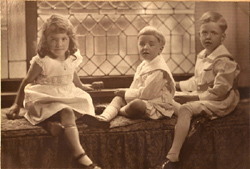 |

|
Betty’s
father was a figure in the community – a minister – so Betty spent most
of her childhood known as a preacher’s daughter. There were times in
her childhood when church services were held in her living room. The
family was poor, but lived by their father’s principal: The Lord will
provide. Unlikely events occurred where, just at the last moment, someone
offered one of her brothers a job and the family was able to buy dinner,
or a parishioner raced to the train station to give the family a cash
gift from the congregation, which allowed them to purchase tickets to
their destination.
With her flaming red hair and curvy figure, Betty attracted the attentions
of many boys her brothers chased away. After just one semester, it was
clear her family could not afford for her to attend college, so she
returned home and took a job to support them, working at the YMCA, Faye’s
Drugstore, a jewelry counter, a restaurant and elsewhere, always getting
promotions, lining up customers out to the street and making a memorable
impression.
|
In Middletown, she met the love of her life, a young man also from poor
roots, Martin Rush, through the Youth Temperance Council, part of the
Woman’s Christian Temperance Union, which advocated and supported wholesome
activities – and avoidance of alcohol – for young people. She married
him in 1941 just before she turned 25, six months past his 22nd birthday.
With the threat of being drafted, he enlisted, a tale which he chronicled
in his memoir, Music Bravely Ringing (iUniverse). The couple
wrote letters daily, sometimes several times in one day. He returned
safely in 1945 and began college on the GI bill. They had a son in 1947,
and in 1950, Martin was accepted as a Rhodes Scholar. The family moved
to England for a year and a half, which forever changed the outlook
of each of them: Now they truly believed that anything was possible.
Martin aimed to be a physician, and Betty aimed to be whatever was needed
of her.
|
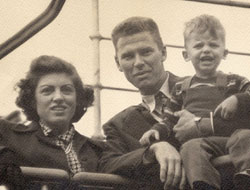
|
The first
birth that Martin, a medical student, ever witnessed was in January
1953 when his instructor allowed him to scrub in while his daughter
was being born. By this time, Betty had blossomed as a person adept
at paving the way for her husband’s success. During the war, she used
every paycheck he sent home to help pay off their home mortgage, so
that he returned home to find he had no debt! They lived in the house
Betty’s father and Martin had built just as the young soldier was
about to leave to go overseas. Now, Betty transformed the "Little
Brown House" into a doctor’s office, the same way her mother had transformed
their family’s living room into a church.
Five years into his life as a small town success story – hard-working-poor-boy-does-good-and-becomes
a successful-doctor – Martin decided his energies belonged at an earlier
point in people’s troubles: instead of treating a medical condition
after it developed, he had deep faith that people’s ailments developed
because their lives made them unhappy. He wanted to practice psychiatry.
During his college years, he had faltered. Concerned that he would
not be able to support his wife and son unless he moved through his
education quickly, he briefly flirted with the idea of majoring in
English instead of pre-med. Betty persuaded him he should follow his
heart. Now, again, he was at a fork in the road. Despite having a
thriving medical practice, with Betty’s blessing, Martin walked away
from financial security to do what he believed in.
|
 |
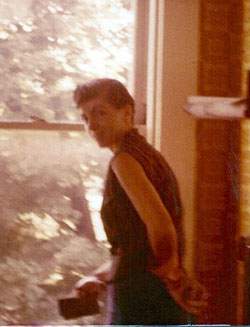
|
The couple
purchased a broken down 1845 farmhouse and moved to a hamlet called
Blue Ball the edge of Middletown where they lived on loans while Martin
attended school to earn yet another degree, as Betty almost single-handedly
painted, scraped and scoured the
farmhouse back to its former glory. Martin opened the doors to his
new office as Middletown’s first psychiatrist in 1962 in bedrooms in
the farmhouse Betty had restored. A few years later when his practice
was well-established, he renovated a chicken coop in the barnyard and
moved his practice there, where he continued to practice until months
before his death in 2010.
During their many years in Blue Ball, Betty started many clubs and hosted
parties. Rather than joining a country club, they built an indoor swimming
pool near the house, so that Betty, a fair-skinned redhead, would not
get sunburned. They filled up the property with pets – dogs, horses,
peacocks, guinea hens, chickens, ducks, a cat or two, goats for awhile
and, briefly, sheep.
|
They
had continued to have ownership of the "Little Brown House" where they’d
lived when they first married. In the 1970s, as a way of combating Empty
Nest Syndrome, Betty began using that house as The Weaver’s Cottage,
a place where she could bring in craft instructors to teach classes.
She started a crafts guild, learned weaving, bought looms, and taught
others all the assorted arts related to weaving including spinning,
carding wool, making skeins, setting up a loom and doing the weaving.
She also taught knitting, crocheting, and lace making and offered resources
on quilting. Instructors taught jewelry-making, ceramics, and other
crafts.
In Blue Ball, she began having a "Down On The Farm" festival in the
barnyard every year on July 4th, where craft makers could come, for
free, and sell their work to anyone who wanted to come look, at no charge.
The festivals were wildly popular for the decade when they were offered.
|
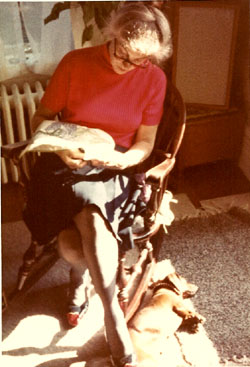 |

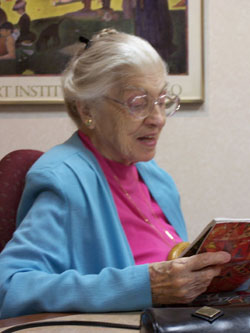
|
In the mid 1980s, with failing health, Betty began thinking it would
be better if they could sell the farmhouse and move into Middletown
to a modest little house she had purchased, surrounded on three
sides by Forest Hills Golf Course. The only problem she could see
was, how would they ever find a buyer for the farmhouse (which they
had nicknamed "The White Elephant")? For years Martin had provided
them with such a good living, they had not needed to put their faith
to the test about any of their wishes. Anything they wanted, they
simply bought.
Without ever putting out a sign, contacting a realtor or even trying
to spread the word that they’d like to sell the farmhouse, one day
in 1985, a Cadillac with two young men and an elderly lady drove
up the farmhouse driveway and asked Betty who owned the house because
they wanted to buy it. Within months, a deal was struck and the
Rushes moved to the Golf Course house in town. Martin continued
to practice psychiatry in the barnyard, occasionally waving across
the fence to the new owners of the farmhouse where the Rushes had
lived for 25 years.
In 1992, Betty suffered a heart condition which haunted her the
rest of her days: her Mitral valve tore loose and had to be repaired
during open heart surgery. In the years following, she had congestive
heart problems but was able to travel with Martin to England several
summers in a row, renting a house boat that carried them down the
Thames, stopping off at ports along the way where the now-elderly
pair guided their rented boat through locks and tethered it while
they took walking tours through towns along the way.
At home, Betty belonged to a stitchery group she had started that
met at the library. She handled all the bookkeeping for Martin’s
business, typing checks on the 1940 typewriter Martin had used during
WWII to write love letters to her. Until past age 80, Martin skied
with his son, who, with his family, now lived in Colorado. Into
his 90s, Martin played a monthly poker game with friends.
|
In 2004,
Martin had a catastrophic stroke, from which he recovered enough so
that he was able to resume his psychiatric practice. Betty’s congestive
heart problems worsened.
In 2010, Cousin Catherine who had named Betty on her own seventh birthday,
passed away several months after her 100th birthday. Although the
cousins now lived far apart and sent only occasional notes to each
other, her death was significant for Betty.
|

|
Periodically
Betty entered the hospital for bronchial distress. Martin and Betty’s
daughter and her husband moved to a nearby location and began hiring
care givers to help them continue to live independently. Martin and
Betty began to kiddingly refer to their house as Cynthia’s Nursing
Home.
Betty’s life ended when Martin died in October, 2010. She drew her
final breath in February 2011. Each died as they had wanted to, at
home in their own bedroom, less than three and a half months apart.
|
| |
|
|
|
|
|
 |
April
2, 1986
(Journal Entry by Betty Rush)
I have just come from a memorial service held for Marge Sauer and
it left me feeling that nothing had been said. As I drove over
here, to my dear little Cottage, I thought, "What would I want
them to say at a memorial service for me?"
There was a large crowd there and as I looked around, I realized how
few names I knew -- faces, yes, but why don't I know names?
My friends seem to understand and Shirley Smith always says -- when
I say a name wrong -- "Oh, she meant 'so-and-so' " -- and
corrects me: "...But go on, we know who you mean..."
Maybe that was what was wrong with the service today -- he (the pastor)
knew her name -- but I didn't feel he knew anything but that---
|
At
my Memorial service, I want to say--
All of you - whose names I can't remember -- I always loved your face
and what you had to say. I enjoyed talking with you and I remembered
things you said to me and it made you special.
How I did love having people come to my house or to this Cottage,
the the Women Especially meetings at the Women's Center, or the Art
& Craft Guild meetings at Bank One and later at the Library --
how I loved it when the Historical Society had a good crowd or the
sun shone on the 4th of July and we had a good "Down on the Farm
Festival." I really loved having you there --
|
|
I'm
happy that I had the opportunity to know so many nice people and that
we could share some of the same interests.
This summer I will be 70 and where once that seemed old, now it doesn't
seem old at all --
Lately though when I allow myself to think about all my "Miller"
family being gone I think also about what dying is -- I am so fascinated
by things old -- antiques -- "precious" and I guess that's
what I think about death -- I can be precious --
The spark that is me won't burn out, it will just glow somewhere else.
I'm going to be a thought-wave out there somewhere still loving. Whatever
is "Me" -- is so precious it just gets consecreated in death.
Don't stop now. Go on living and loving. We'll miss each other --
and yet in the quiet of many an evening or the hush of an early morning,
I've felt the precious nearness of Owen, Jim, Mother Dad, and at those
times I knew that the unspoken moments are precious.
You've all been precious to me -- I'm glad you came and although we
are saying "goodby" -- still we'll have precious moments
again when you remember me.
|